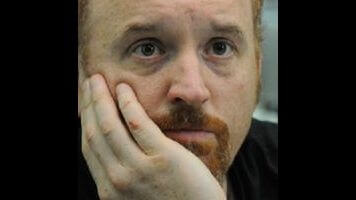Louie: "Moving"

Louie is, on some level, all about its protagonist’s attempts to understand and makes sense of a chaotic and random world. Heaven knows there are few things more chaotic and random than the soul-crushing practice of finding a new place to live and moving. This is amplified sevenfold if you’re a New Yorker. New York is the epicenter of many things: surreally shitty living situations chief among them.
In “Moving” CK decides to move out of his apartment in an attempt to make a clean break from his sad old life and embark on a dazzling new path. It’s a symbolic as well as practical gesture. He wants to rid himself of the old ghosts and painful memories and embark on a new destiny.
He wants a place that reflects who he is and where he is in life. Alas, the first few places he visits with friend Pamela Adlon, convey all too accurately where he is in life: fucked. CK endures a jazzy montage of apartment-seeking disasters before encountering the worst of them all: a strange, only-in-New-York pad with a toilet in the kitchen and a confused, underwear-clad old man in the kitchen.
Looking out the window of the man’s apartment, Louie sees something strange even for New York: a crazed-looking homeless man being man-handled, then returned to his original spot by some fed-looking individuals in black suits. As with much of Louie, it’s not entirely clear how we’re supposed to process this. Did this actually happen? If so, why? Is Louie imagining it? If Louie is imagining it, then why? Crazy shit like that happens all the time in Louie. We’ve been trained to accept and expect a lot of strange, random business. We’ve been trained to go along with the ride and not question where we’re headed, which is much of the show’s live-wire appeal: it literally can go just about anywhere.
Sitcoms and dramas and soap operas and police procedurals condition audiences to expect certain things: laugh tracks and three-act structures and arcs and whatnot. Louie goes without many of those things so it has to condition audiences differently and with a much different set of expectations. We expect, for example, that at various points in Louie the show will go from objective to subjective as we push past boring old regular reality and into Louie’s fantasies and day-dreams.
CK grows as an actor with each episode. There’s a wonderful moment at the end of CK’s trip to the creepy toilet-kitchen-apartment after CK’s friend Pamela Adlon leaves in disgust where he exchanges a look with the creepy old man in his underwear of commiseration, empathy and, primarily, confusion. Neither man understands the world around him or his place in it or what exactly it is the other man happens to be doing at that particular place.
Like many of us, CK keeps expecting the world to make sense and conform to certain universally accepted rules. He is subsequently constantly disappointed if not surprised, when it doesn’t make sense or play by the rules. For example, there’s a great scene where CK and Adlon visit an Israeli-seeming dude who looks like Michael Ian Black about a great-seeming apartment.
 Keep scrolling for more great stories.
Keep scrolling for more great stories.
